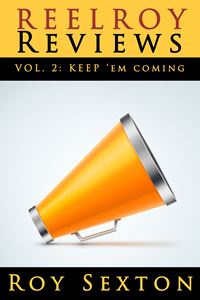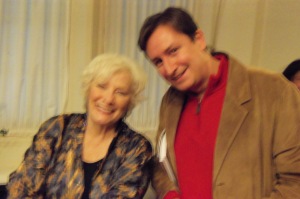![Description: Film poster; Source: Wikipedia [linked]; Portion used: Film poster only; Low resolution? Sufficient resolution for illustration, but considerably lower resolution than original. Other information: Intellectual property by film studio. Non-free media use rationales: Non-free media use rationale - Article/review; Purpose of use: Used for purposes of critical commentary and illustration in an educational article about the film. The poster is used as the primary means of visual identification of this article topic. Replaceable? Protected by copyright, therefore a free use alternative won't exist.](https://reelroyreviews.files.wordpress.com/2015/02/fifty-shades-of-grey.jpg?w=200&h=300)
[Image Source: Wikipedia]
I feel like I need to have my brain scrubbed with turpentine and disinfectant after the double feature we just endured:
Fifty Shades of Grey and
Kingsman: The Secret Service.
Were these movies bad? No, not at all. Did I enjoy myself? Yes, for great swaths of both flicks. Will I hate myself in the morning (and have some really loopy dreams)? Decidedly yes.
Both films are adapted from literary works … Albeit one is a soft-core porn trilogy written by Twlight-fanfic-aficionado E.L. James and is sold conveniently to S&M-curious grocery shoppers at Wal-Mart, Target, and Meijer. The other is a graphic graphic novel created by comic book iconoclasts Mark Millar (Kick-Ass) and Dave Gibbons (Watchmen) for whom bloody violence and gore is a balletic vehicle for cheeky satire and whose work is distributed via corner comic shops to superhero and gaming fetishists who greedily devour it from their befuddled family members’ basements. (In full disclosure, save that basement reference, I fall firmly in the latter camp and never in the former, though I do shop at Target and Meijer a lot.)
As for the film adaptation of Fifty Shades, whose chief contribution to popular culture seems to be the mainstreaming of kink (provided you happily equate it with vampirism), I found that I really enjoyed all the narrative elements that had absolutely nothing to do with the core subject matter. When otherwise charming leads Jamie Dornan (“Christian Grey”) and Dakota Johnson (“Anastasia Steele” – cripes, these names) do finally get to the “sexytime,” a term I’m borrowing out of necessity from Sacha Baron Cohen’s Borat, the movie grinds (no pun intended) to a halt. Johnson exhibits a delightfully natural comic timing which belies her status as Don Johnson and Melanie Griffith’s progeny, let alone as Tippi Hedren’s granddaughter, and Dornan does bemused hunky brooding better than anyone this side of the CW.
Their … ahem … courtship seems to be from a different movie entirely (thank heavens) than all the dirty business. I enjoyed their banter (underwritten though it is), and director Sam Taylor-Johnson has the good sense to cast as Christian and Anastasia’s respective mothers Marcia Gay-Harden and Jennifer Ehle (both sleekly slumming here). It crosses my mind that someone should remake the feather-light froth of Barefoot in the Park or Any Wednesday and throw Dornan and Johnson in the roles; no whips, chains, bare ass-cracks, or nipples required.
Watching Fifty Shades (and, mind you, I didn’t hate it), I kept wishing for the film to leave that stupid “red room of pain” and return to Anastasia’s shabby chic college flat (oh, how I adore the darling roommate played by Eloise Mumford) or Christian’s shimmering spaceship of an office, populated as it is by admins who wouldn’t be out of place in Robert Palmer’s “Addicted to Love” video. I truly enjoyed all the silly soap opera shenanigans around the stilted sex scenes.
Remember that certain musical production number of yore, the dull kind that went on forever and had Cyd Charisse entangling Gene Kelly in a thousand-mile-long chiffon scarf (which in itself is kinda kinky)? That’s how I felt about all of Fifty Shades‘ tie me up, tie me down, Beauty-and-the-Beast boudoir moments.
It is a testament to Taylor-Johnson’s direction that she is able to pull together some semblance of romance and charm and wit from what I’ve heard are shoddily written books. And, no, I am never going to read them! Bully for her.
![Description: Film poster; Source: Wikipedia [linked]; Portion used: Film poster only; Low resolution? Sufficient resolution for illustration, but considerably lower resolution than original. Other information: Intellectual property by film studio. Non-free media use rationales: Non-free media use rationale - Article/review; Purpose of use: Used for purposes of critical commentary and illustration in an educational article about the film. The poster is used as the primary means of visual identification of this article topic. Replaceable? Protected by copyright, therefore a free use alternative won't exist.](https://reelroyreviews.files.wordpress.com/2015/02/kingsman.jpg?w=202&h=300)
[Image Source: Wikipedia]
is by far the better film, chiefly because director Matthew Vaughn (
X-Men: First Class,
Kick-Ass,
Stardust,
Layer Cake – this last one starring “ultimate James Bond” Daniel Craig) wisely casts Colin Firth in the lead role, a role which cannily plays
to and toys
with Firth’s persona as the consummate Brit gentleman. In prologue to one of Firth’s many jaw-dropping, gymnastically-choreographed fight scenes, he intones “manners maketh man.” Firth is clearly having the time of his life playing a Savile Row “dapper dan” tailor who happens to lead a double life as a Kingsman, a super-secret agent keeping Queen and Country (and pretty much all of us on this planet) safe from bomb-dropping megalomaniacs
and local bar-brawling hooligans. He is a joy to watch.
Much of Vaughn’s film is a pleasure, like Dr. Strangelove if directed by Quentin Tarantino on a bender from too many viewings of Moonraker, Octopussy, Smiley’s People, and Austin Powers. Firth (“Harry Hart/Galahad”) takes his orders from a wry Michael Caine (“Arthur”) with tech guidance from the warmly imposing Mark Strong (“Merlin”).
As Samuel L. Jackson’s “Valentine” (an intentionally corny mashup of Bill Gates, Mark Zuckerberg, Blofeld, and Dr. Evil) determines that the best way to cure global warming and other ills affecting this planet is to divest Earth of its “disease” (that would be us humans), Firth and his fellow Kingsmen race against the clock to expand their ranks with new recruits to foil Valentine’s cartoonishly gruesome plan.
Taron Egerton (a British mix of James Cagney and Matt Damon) is a wonderful new cinematic presence as aspiring Kingsman “Eggsy,” and his Eliza Doolittle/Henry Higgins scenes with Firth sparkle. Akin to Fifty Shades, I kept wanting the mayhem to stop so we could have more sprightly character development with this dynamic duo.
However, the violence – granted one of Vaughn’s signatures (along with hyperkinetic fight scene editing) – is a bit of a boat anchor around the film’s otherwise bright-hearted and buoyant spirit. There is just so much gore – body parts flying every which way, hyperbolic gun-play, medieval skewerings – that the satire becomes lost in the junior-high-boy juvenile excess and self-indulgence. I will admit, though, that the sight of Firth massacring a whole church full of hypocritical redneck bigots (an obvious stand-in for the hate-spewing Westboro Baptist Church and … others) is a guilty pleasure I shall carry in my heart for all time.
(Also – spoiler alert – no animals are ever hurt, though there is a peculiar test of the Kingsmen recruits that, well, tested my patience. Kind of an Old Yeller moment that ended up being a total ruse. People hurt? Lots. Animals hurt? None.)
I’m not sure I would go so far as to recommend either film, as I worry what you, dear readers, would think of me and of my mental stability if you ventured forth to see Fifty Shades or Kingsman based on my recommendation. However, if you feel like taking in a guilty pleasure (or two) suffused with a heaping helping of puerile foolishness, these films are for you. Yet, this evening’s offerings definitively reminded me that just because something can be depicted on film doesn’t mean it should be depicted on film. Manners maketh man, indeed.
____________________________

Reel Roy Reviews 2
In addition to online ordering at Amazon or from the publisher Open Books, the first book is currently is being carried by Bookbound, Common Language Bookstore, and Crazy Wisdom Bookstore and Tea Room in Ann Arbor, Michigan and by Green Brain Comics in Dearborn, Michigan.
My mom Susie Duncan Sexton’s Secrets of an Old Typewriter series is also available on Amazon and at Bookbound and Common Language.








![[Image Source: Wikipedia]](https://reelroyreviews.files.wordpress.com/2017/02/split_2017_film.jpg?w=201&h=300)
![[Image Source: Wikipedia]](https://reelroyreviews.files.wordpress.com/2017/02/sing_2016_film_poster.jpg?w=202&h=300)
![[Image Source: Wikipedia]](https://reelroyreviews.files.wordpress.com/2017/02/lion_2016_film.png?w=210&h=300)

![Description: Film poster; Source: Wikipedia [linked]; Portion used: Film poster only; Low resolution? Sufficient resolution for illustration, but considerably lower resolution than original. Other information: Intellectual property by film studio. Non-free media use rationales: Non-free media use rationale - Article/review; Purpose of use: Used for purposes of critical commentary and illustration in an educational article about the film. The poster is used as the primary means of visual identification of this article topic. Replaceable? Protected by copyright, therefore a free use alternative won't exist.](https://reelroyreviews.files.wordpress.com/2015/02/fifty-shades-of-grey.jpg?w=200&h=300)
![Description: Film poster; Source: Wikipedia [linked]; Portion used: Film poster only; Low resolution? Sufficient resolution for illustration, but considerably lower resolution than original. Other information: Intellectual property by film studio. Non-free media use rationales: Non-free media use rationale - Article/review; Purpose of use: Used for purposes of critical commentary and illustration in an educational article about the film. The poster is used as the primary means of visual identification of this article topic. Replaceable? Protected by copyright, therefore a free use alternative won't exist.](https://reelroyreviews.files.wordpress.com/2015/02/kingsman.jpg?w=202&h=300)
